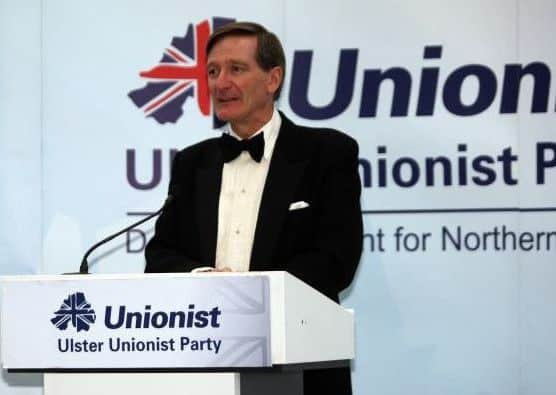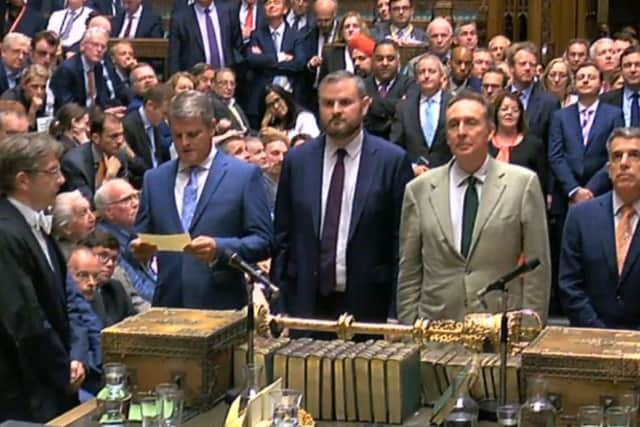Brexit: Irish Sea border completely unacceptable, says top Remainer
and live on Freeview channel 276
The Conservative MP Dominic Grieve, on a visit to Northern Ireland, said that he and his colleagues would not tolerate an internal UK border.
“A border down the Irish Sea is completely unacceptable and I think it’s abundantly clear that the government will never accept it,” the MP for Beaconsfield told the News Letter.
Advertisement
Hide AdAdvertisement
Hide AdThe remarks are significant because strongly pro-Remain politicians such as Mr Grieve are thought to be the most likely parliamentary supporters of an arrangement such as Northern Ireland staying in the customs union and single market unlike the rest of the UK, which would necessitate an Irish Sea frontier.


Mr Grieve, who addressed an Ulster Unionist Party dinner at the end of last week shortly after he had saved the government from defeat on a key Brexit vote, told this newspaper that he had been worried the Conservative Party would “disintegrate” and that Jeremy Corbyn would become prime minister.
He ended up voting against the so-called ‘Grieve amendment,’ named after him, that sought to give MPs a “meaningful vote” on any Brexit deal after he received a ministerial assurance of parliamentary sovereignty.
Asked if he considered himself to be a unionist, Mr Grieve said “absolutely”.
Advertisement
Hide AdAdvertisement
Hide AdWhat then did he say to those unionists who feared a last-minute betrayal by the British government of an Irish Sea border to secure an EU deal?


“Well, no, it can’t happen because if it were to happen the government would fall,” he said. “Do bear in mind that even somebody like me, who is a Remainer, could never accept such an arrangement.”
But was such an internal border not the inescapable logic of the Irish government’s position, which was that there could be no checks or infrastructure at the land border, and which also appeared to be that there could be no customs or regulatory divergence at the land border either.
“I’m not sure it’s the inescapable logic of the Irish government’s position,” he said. “It’s the inescapable logic of the EU’s position, unless the UK government does something to change its own position on the future of its relationship with the EU in its totality.
Advertisement
Hide AdAdvertisement
Hide Ad“This is one of the big issues that we’re going to have to resolve isn’t it?”
Mr Grieve was asked about the alternative scenario in which the whole of the UK stays in the customs union and the single market to resolve the Irish border issue but in the process renders Brexit almost pointless.
“Some people should have thought about this problem before we held the referendum in 2016,” he replied.
“We’re going to have to have a national conversation about the impact of what Brexit is going to do to our Union and my view is that the Union is much more important than the terms of Brexit.”
Advertisement
Hide AdAdvertisement
Hide AdAsked how many of his backbench colleagues feel the same, he replied: “I think the vast majority of the Conservative party. I have to say to you I haven’t really come across anyone who has taken a different view, although some of my colleagues believe that the EU’s position on this is exaggerated and that it may moderate as we proceed [towards Brexit].”
Does he think that will happen?
“I can see that there may be some flexibility in the system and it’s in everybody’s interest to try to come to a deal. That said, I also think that it is a very serious obstacle.”
Mr Grieve acknowledged that Dublin’s insistence that the matter be resolved by March, and then by June, had not happened.
“No it hasn’t, but looked at from Dublin’s point of view this is a pretty important issue for them,” he said.
Advertisement
Hide AdAdvertisement
Hide Ad“Ireland is the biggest loser from Brexit apart from possibly the UK itself, although some of my colleagues from Westminster would disagree on that.
“But potentially, for the government of the Republic, this is a very big issue and so I’m not surprised that it’s something on which they’re spending a lot of time.”
Mr Grieve said that he voted with the government last week because he feared that the Conservative Party would “disintegrate”.
He suddenly decided to help ministers defeat the so-called ‘Grieve amendment’ on giving the House of Commons a “meaningful vote” on any Brexit agreement.
Advertisement
Hide AdAdvertisement
Hide AdHis U-turn on Wednesday followed a ministerial assurance about the sovereignty of parliament and helped the government to a 319-303 victory.
Asked by this newspaper about reports that he dropped his opposition because he thought the government would have to call a snap general election if defeated, Mr Grieve denied that but said: “I did feel at the end that the issue had become so difficult within my own party that I would see that if the government were defeated, it could lead to the party disintegrating as a cohesive unit and that’s something one has to keep very much in mind.”
He added: “If a Conservative government were to fall, we might end up in a situation where we had Mr Corbyn in Downing Street and I would see that as a really bad outcome for our country.”
Mr Grieve said that the Labour Party leader has “no policies to address the issue of Brexit”, and added: “I also wanted to support the prime minister because she’s going over to Brussels to negotiate.”